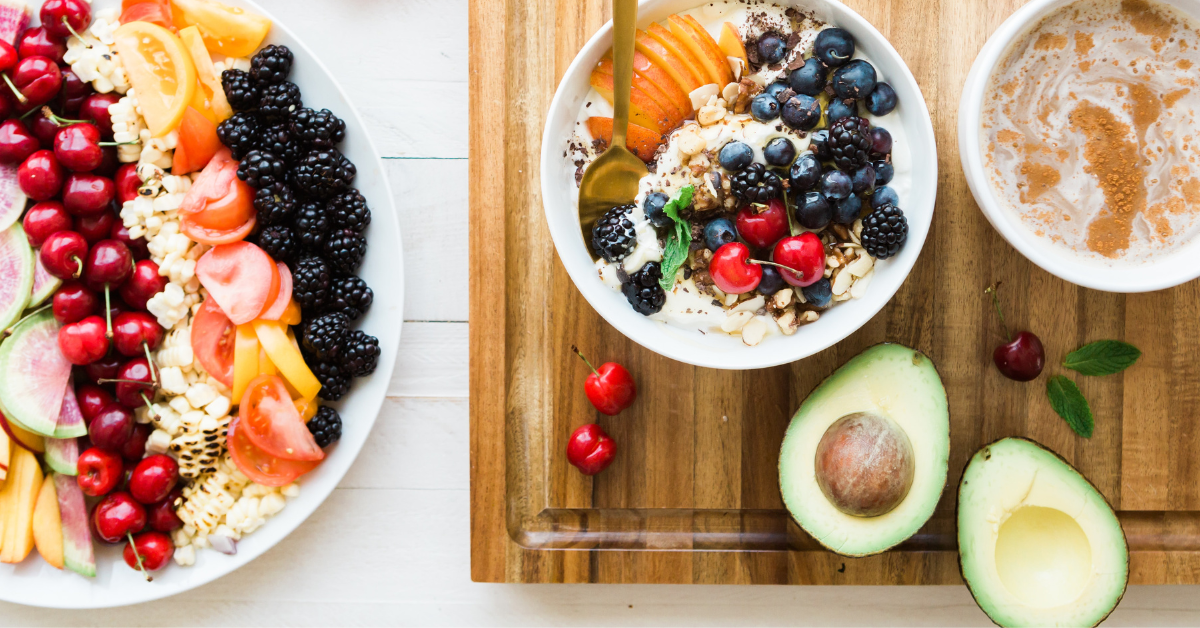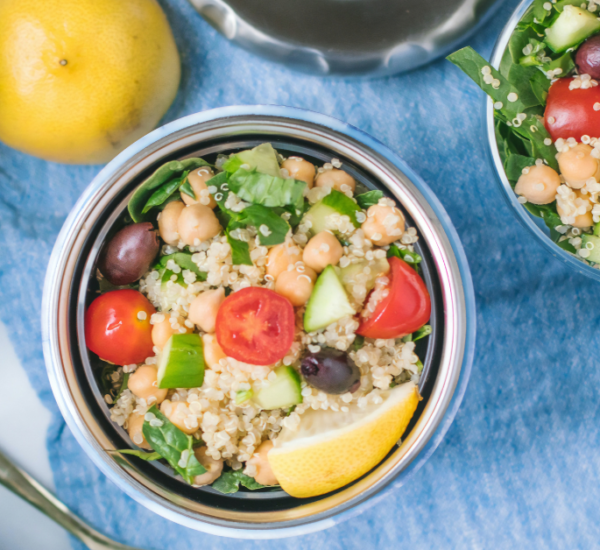Cut the carbs and I can guarantee you’ll see a fast drop in weight. Great news, right?
Not exactly. A few days into your low-carb diet you may feel fatigued, crave sugar and, when you finally call it quits, the kilos you initially lost tend to creep back on.
This initial weight loss isn’t from fat, but rather the loss of water, some muscle and glycogen (stored energy) within our muscles and liver.
Here are five things you need to consider before you completely cut carbs:
1. Nutrients found in carbs
Many carb-rich foods go hand-in-hand with fibre, so when our diet is stripped of wholegrains, fruit, legumes and starchy veg it becomes particularly difficult to eat enough fibre, leading to a sluggish bowel.
Foods such as barley, bananas, legumes and cooked-then-cooled potato, pasta and rice also contain resistant starch, which healthy gut bacteria love to feed on.
Along with fibre, many vitamins, minerals and phytochemicals such as antioxidants are also found alongside carb-rich foods.
2. Replacing carbs with poor choices
While healthy alternatives to carbs can be made, many low-carb trends see fatty meats such as sausages and bacon make their way back onto the plate.
High in saturated fat and preservatives, these overly processed meats are no good for health and are associated with an increase risk of high cholesterol, blood pressure, heart disease and bowel cancer.

3. Carbs being a ‘premium’ source of energy
Carbohydrates are the preferred fuel source for your muscles, central nervous system, organs and brain.
During digestion, carbohydrates are broken down to glucose and the hormone insulin helps pull glucose into your cells to fuel your body and power your brain.
If we fail to fuel our body right we can experience a drop in blood glucose levels leading to hunger, lethargy and a foggy brain.
4. Carbs helping with sugar cravings
While an omelette for breakfast and chicken and salad for lunch packs a nutritional punch, skimping on the carbs earlier in the day will lead to dips in blood glucose levels and strong sugar cravings mid afternoon, if not earlier.
5. Carbs optimising fat burning
Lowering your carb intake below basic metabolic needs will see your metabolism slow down in an attempt to survive on fewer calories.
This is why those who continue to cut the carbs struggle with losing weight, despite sticking to their exercise plan.
In a nutshell, your muscles need carbs to perform at their best and for you to effectively burn fat.

So what’s the solution?
It’s clear that carbs are needed to achieve optimal health, so why the bad rep? Firstly, the widespread use of refined carbs and hidden sugars in many high-energy processed foods contributes to the idea that “all carbs are evil” and secondly, unlike protein, they’re easy to overeat.
The secret is to team protein with some carbs to keep your blood glucose levels steady, food cravings at bay and energy systems firing all day long.
Unlike refined carbs, smart carbs will provide you with lasting energy between meals and keep you full for longer.
These include:
- Wholegrains (oats, barley, quinoa, buckwheat and brown rice and pasta)
- Legumes (beans and lentils)
- Starchy veggies (sweet potato, corn and low GI potatoes)
- Fruit
- Dairy
- Wholegrain breads and cereals.
When shopping look for words such as wholegrain, high fibre and low GI.
While there is no need to rid your diet of carbs, the truth is we can certainly pay closer attention to the amount we eat – particularly the processed kind.
By eating sensible portions of smart carbs you will have greater control over your diet and experience a renewed sense of vitality.















I have poly-cystic ovaries and my symptoms include insulin resistance which is like glucose intolerance. The only diet that has worked for me is low-carb. When I followed the 1200cal 12wbt diet and increased my exercise I didn’t lose weight. When I customised my meal plan to only low-carb meals I started losing weight. I have researched my condition and from the research I found that I do need to follow a low-carb diet to be a healthy weight.
What if you replace carbs with fat? There is no mention here of how our bodies can survive on good fats to replace carbs, how our brains need saturated fat to survive. There is so much research to suggest that good fats such as avocados nuts coconut oil etc can replace the energy burning you get from carbs and even better our health in the process. I have done the 12wbt in the past but have learnt so much since about fat and it’s incredible health benefits. So very reluctant to take it on again given the whole encouragement to have low fat dairy etc on the 12wbt which is full of sugar to replace the fat. Doesn’t make any sense to me. I think the program needs to be updated for people who don’t want to eat carbs. People with diabetes who eat carbs which turn into sugar, the world is finally coming to realise that carbs except from fruit and veg are not good for our bodies, the 12wbt needs to catch up.
Hi Angie – The problem with replacing all smart carbs (including fruits, legumes, vege and wholegrains) with fat alone is that you are losing out on FIBRE. This brief article was to highlight that there are many beneficial reasons to eat smart carbs, another article on fats might be our next job!. We agree that fat plays a magnificent role in the body, especially in keeping the body satisfied for longer. We love wholegrain toast with a poached egg, nut butter, smashed avocado or ricotta for that reason – a beautiful combination of smart carbs with lovely fats and protein.
I hope this helps.
All the best,
Leila
12WBT Support Crew
It’s easy to see why some people find low-carbohydrate diets hard to follow, if this is the standard of advice they’re getting from dietitians.
Firstly, this thing about weight loss being due to loss of water, glycogen, and muscle. I think you will find that using stored fat for energy will result in steady weight loss if you’re overweight. There is evidence that LCHF diets reduce post-prandial glycogenolysis and increase non-oxidative glucose disposal, e.g. glycogen synthesis, so there’s a conservation of glycogen going on when the body burns fat instead, as might be expected. As for water, all the water lost on the LCHF diet is not necessarily bound to glycogen, and its loss tends to normalise blood pressure and improve conditions such as oedema and ascites, so losing water weight isn’t a bad thing. Muscle won’t be lost if you eat enough protein – otherwise athletes wouln”t follow this diet – think about it!
If you feel weak and hungry when you go without bread and sugar, if you get sugar cravings, that indicates what bread and sugar are doing to you. Once you no longer eat those sorts of foods, you won’t feel weak and hungry when you don’t eat.
This phrase is telling – “Lowering your carb intake below basic metabolic needs will see your metabolism slow down in an attempt to survive on fewer calories.”
Why would you be having fewer calories? Aren’t you supposed to increase fat on the LCHF diet? In fact you will be able to survive on fewer food calories (assuming you really do need to lose weight, of course) once you start burning your fat stores, but this shouldn’t be a struggle.
As for the idea that a low-carb diet is low in fibre, or deficient in anything; I find it amazing that supposedly qualified and accredited dietitians in Australia say that they are unable to formulate a nutritionally adequate low-carb diet. Other dietitians and lay people have been doing this for years.
Here is a list of some of the fibre and vitamin rich fruits and vegetables which can be eaten on a low-carb diet:
tomato, zucchini, bean pod, berries, spinach, kale, cabbage, avocado, cocoa, cabbage, Brussels sprout, capsicum, chilli, herbs, spices, nuts, seeds, carrots, parsnips, garlic, onions, shallots, leeks, broccoli, cauliflower, marrow, pumpkin, mushroom, olives, capers (takes a deep breath)…
While protein rich foods are great at filling you up, the secret is to team them with some fats, which you can use to cook or dress these fibrous vegetables, to keep your blood glucose levels steady, food cravings at bay and energy systems firing all day long.
Hi George – Thanks for your detailed response. Much food for thought there!
This article was written to highlight that carbs should not be feared. You address the fact that there is a load of fibre in vegetables, we certainly agree with you. A wholefoods approach using vegetables is certainly a smart way to control the waistline and boost the fibre. As a program that watches the calorie content of recipes, non-starchy vege are a huge feature of all our recipes at 12WBT.
At 12WBT many of our members engage in up to an hour of exercise 6 days per week. The ‘theory’ of a LCHF diet is fine and as a Sports Dietitian I have studied this intently. In practice, what Louise Burke, the head of nutrition science at AIS and her colleagues found in the 1990s and 2000s was that by ramping up fat burning, you also curb carb-burning. That’s a problem, because carbohydrates provide the rapid fuel needed for high-intensity bursts. Something that our 12WBT Members rely on, particularly in interval style sessions and Express Workouts.
So rather than cutting carbs or glorifying another macronutrient, we know that carbs play an important role in regulating and replenishing the body in a number of ways. Plus, let’s not forget carbs are delicious!
Nutrition Science is a very young science and as dietitians we are keen to keep a watch on the benefits of LCHF diets. But for now, let’s take a balanced and evidence based approach that shows that carbs are not the ‘bad guy’ and can be a part of a nutritious diet.
All the best,
Lisa Donaldson
12WBT Sports Dietitian
If you’ve tried a low fat/ calorie diet and just couldn’t stick to it, keep this in mind – the diet failed, not you. Very low fat/ calorie diets are not easy to follow and while they may offer a quick fix, long-term weight loss is unlikely.
Seriously – your answer to curbing sugar cravings is to eat more carbs? The less sugar you eat, the less sugar you crave. Like any drug, once you get through the withdrawal phase, you no longer crave it, and your body can survive just fine with fat as its primary fuel source. Your article is based on outdated science.
Hi Nicole – This article was to highlight that there are many beneficial reasons to eat smart carbs, another article on fats might be our next focus! We definitely agree that fat plays a major role in the body, especially in keeping the body satisfied for longer. We love wholegrain toast with a poached egg, nut butter, smashed avocado or ricotta for that reason – a beautiful combination of smart carbs with lovely fats and protein.
All the best,
Leila
12WBT Support Crew
You mention liw carb potatoes… Are they particular types of potato, or the way it is cooked? Recommendations for types?
Hi Lesley – The low GI potatoes Jenelle refers to are ‘Carisma Potatoes’, developed by the CSIRO. They are a little more expensive than regular potatoes and are found in many supermarkets.
All the best,
Leila
12WBT Support Crew
I love the article on low carb- and why it is not the answer to long term health. Having watched 2 recent shows on gut health it seems that high fibre found in carbs is essential to long term health. Makes me think more about what a load of garbage the paleo diet is as well…. Um correct me if I’m wrong but we have evolved for good reason.
I’m thinking about joining but my querie is I play lawn bowls and golf , very regularly so can this be incorporated into your exercise plan. You don’t also mention swimming
Hi Sandra – Absolutely you can incorporate your lawn bowls and golf into your workouts! If you are already leading an active lifestyle and partake in activities you love, then we know you’ll stick to them! Alongside swimming, both would be considered fitness activities, so for balance and best results we’d also recommend following our prescribed 12WBT strength/toning and core/flexibility exercises on your other days.
With regards to swimming, if you are going to swim as the entire fitness workout, you want to aim to do at least 45 mins of continuous exercise (or as much ‘continuous’ as physically possible). You’ll know if you’re working hard enough – you should feel like you’re having a workout, and are puffing away!
I hope this helps – we’d love to have you on the team!
All the best,
Leila
12WBT Support Crew